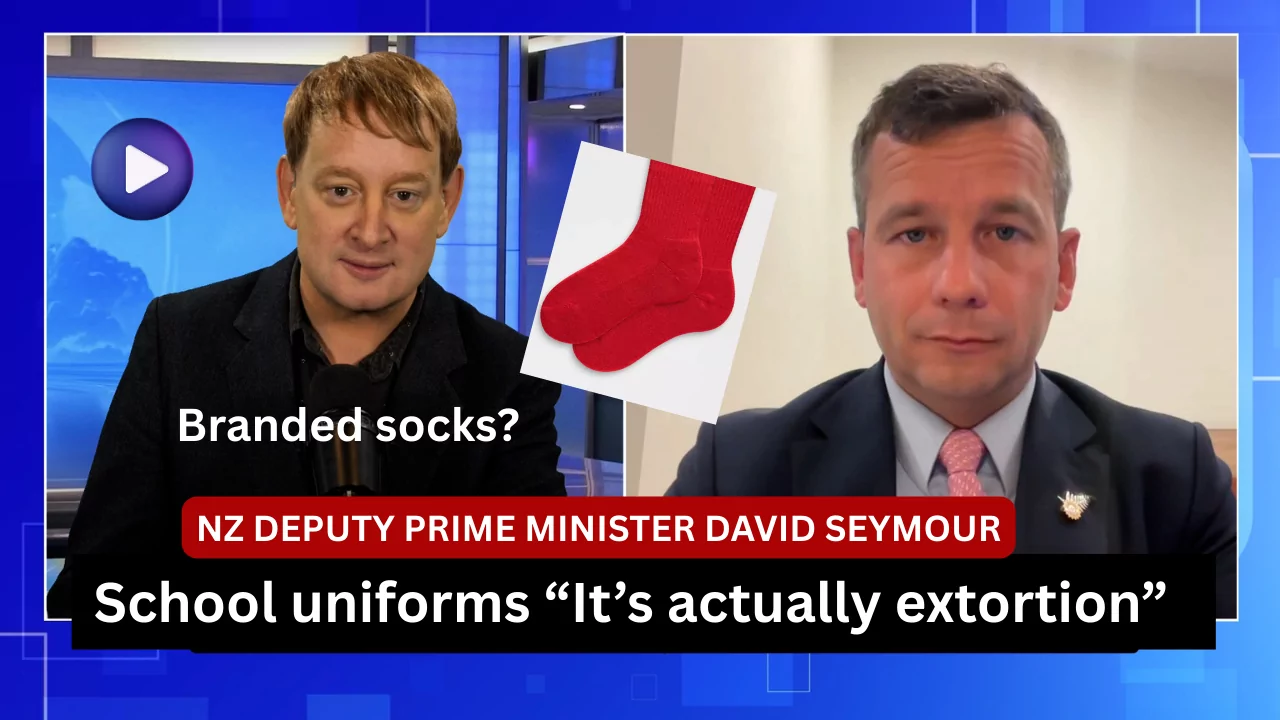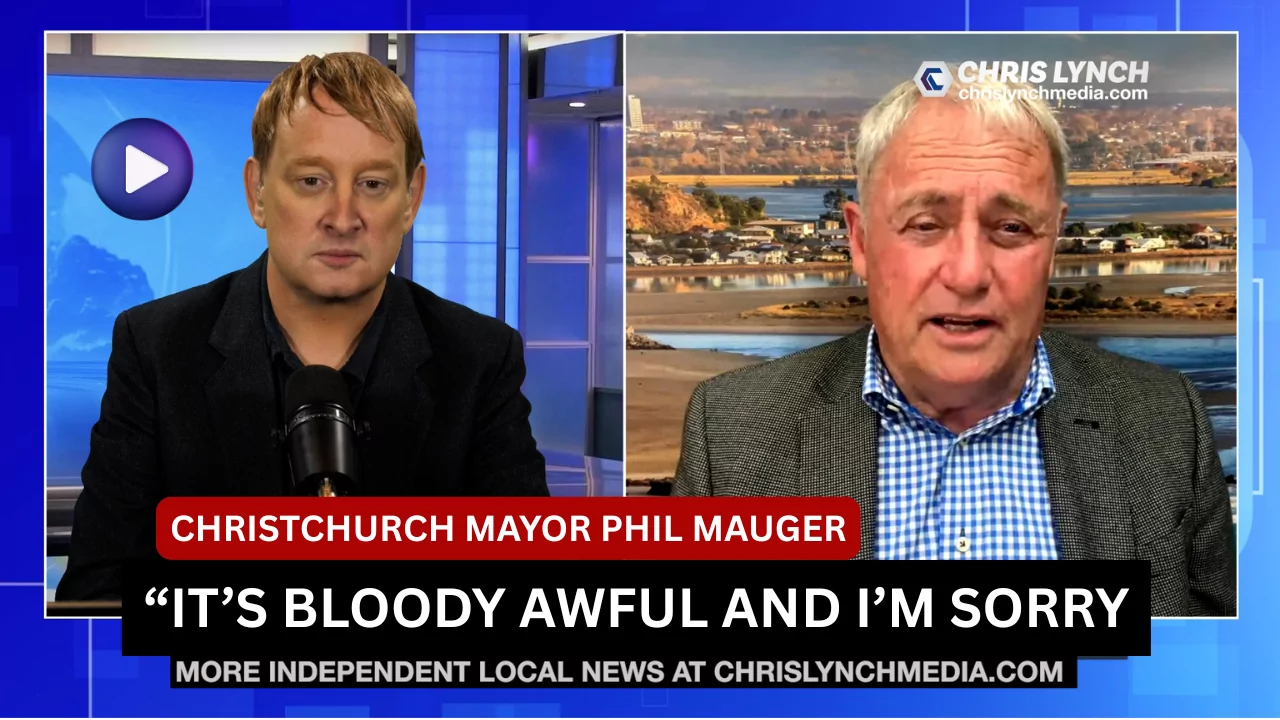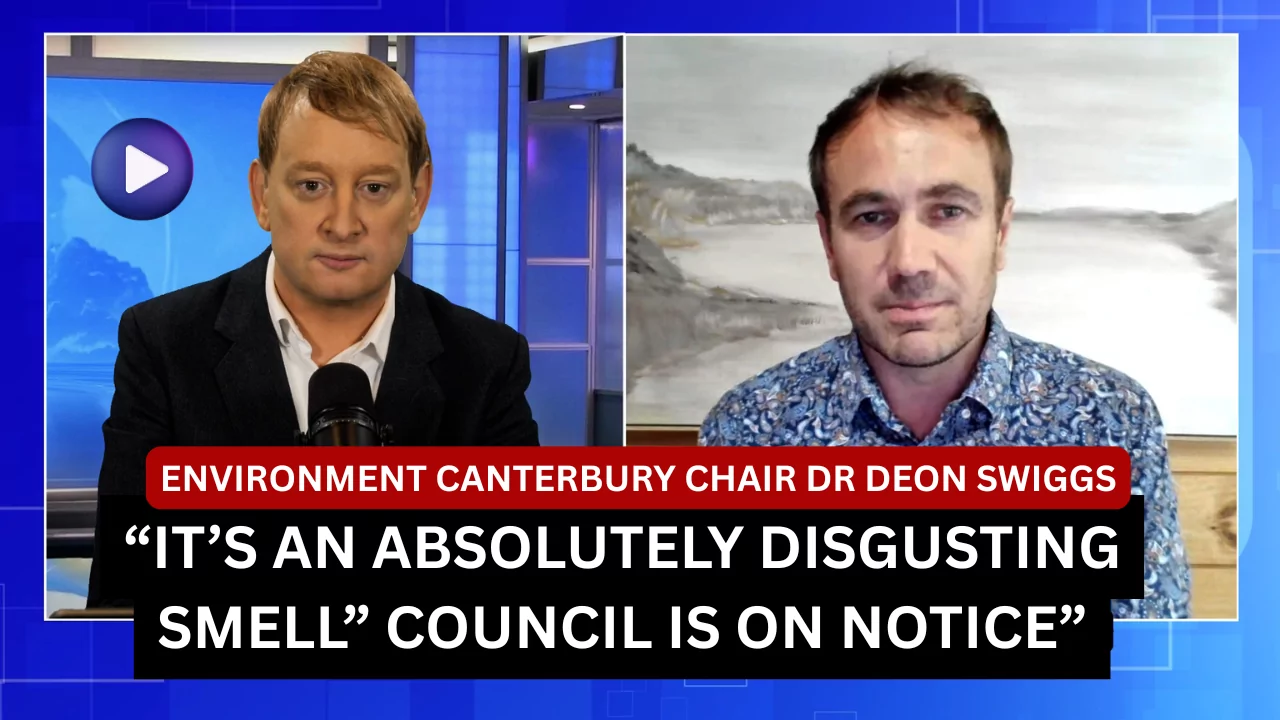Escaped youth tracked by Eagle helicopter, found hiding in New Brighton
The young person who escaped from a youth justice facility in Rolleston has been located...
Christchurch Mayor Phil Mauger and mayoral candidate Sara Templeton faced off on Wednesday night in a live debate hosted by Chris Lynch Media.
The hour long discussion canvassed rates, transport, asset sales, climate change, leadership style, and the long-term direction of the city.
Mauger was challenged on his 2022 campaign pledge to keep increases below 4.5 percent, after actual rises proved higher.
“Why should ratepayers trust you this election?” he was asked.
“I shouldn’t have probably said that,” Mauger said. “One of the things I didn’t realise was how much our interest payments on our debt was and also things like forty million for our insurance premiums. The cost of living crisis is affecting us as much as it is everyone out there.” He added, “We actually started off in the mid nines and we got it down to 6.6, which if you take the stadium off, which some people do, it down to five. I won’t put a number on it ever again.”
Templeton was then asked about her opposition to rates caps, given some communities themselves have called for one. She argued they restrict public influence over council decisions. “We need to make sure that we’ve got an affordable city, not just cheap rates,” she said. “Rates caps really do limit the ability for our communities to influence what council can spend their money on.”
She warned that caps would shift costs elsewhere. “It puts enormous pressure on councils to raise revenue through other measured methods things like raising library fees, pool fees, car parking charges. It also puts pressure on councils to sell assets.”
When pressed on evidence, Templeton said overseas examples supported her case. “It’s happened in Australia. When councils are faced with an artificial rates cap, the pressure goes straight onto revenue through other means.”
Mauger responded that a cap is likely unavoidable. “If the government have said if they’re thinking about a rates cap, let’s not keep our head in the sand, it is more than likely going to happen. We’re already there compared to other places like our neighbours on 12 or 13 percent.”
Templeton disagreed. “We’re actually nowhere near close to that five percent,” she said. “Next year is looking at 10.5 percent. That’s a big chunk we would need to find and a long way from the five percent that’s being talked about.”
The debate then shifted to council spending priorities. Templeton said, “We shouldn’t be spending five million of ratepayers money on an aircraft hanger for an old airplane when that’s something the Defence Force should be spending.”
Mauger defended the funding. “The Air Force Museum is totally paid for and run by the Air Force. The number of people it attracts into the city is a lot. It’s a valuable part of what the city is. Five million is a small price to pay.”
On leadership style, both were asked how they differ. Templeton said: “I work really collaboratively. I’m not a rubber stamper. I’ve chaired hearings panels and listened closely to the community. That’s how I’ve managed to get things across the line.”
Mauger said relationships were his strength. “No councillor comes to work to do a bad job. My job is to build relationships with those people and get everyone trying to get consensus where we can. You can fight like cat and dog in a meeting, but if you’ve got a good relationship you can have a coffee or a beer afterwards and get on with it.”
Transport was another flashpoint. Lynch asked Templeton about her criticism of Mauger’s one-on-one approach with government ministers, suggesting it sidelined council mandates. “That wasn’t something that was mandated by the rest of council,” she said of a phone call regarding transport funding. “We had specifically passed a resolution as a council asking for 78 million for public transport.”
Mauger rejected that claim. “It’s misinformation,” he said. He added that when a new government took office the money “was going to vanish” regardless, and that later “the council has managed to get 275 million extra for roading in Christchurch on top of what we already get anyway.”
Asset ownership was also put under the spotlight, with both asked what they would do if elected. Mauger ruled out selling strategic assets. “We need to have control of our airport,” he said. “We certainly need to keep control of our port total control. And Orion, our electrical network, don’t touch them.” He added, “Other companies like EcoCentral and Enable, I’d leave that up to Christchurch City Holdings.”
Templeton warned that selling service companies like EcoCentral would backfire. “It’s our recycling centre. If we sold it, a private monopoly could charge whatever they wanted which would mean it would cost us more to get our recycling done and then those profits wouldn’t come back into the city.”
When the discussion turned to housing intensification, Lynch asked about the rejected proposal to rezone land south of Moorhouse Avenue. Templeton said, “It creates another really cool mixed-use area close to the centre city. The actual result isn’t anything to do with the central city. It’s to do with our suburbs and more intensification in suburban centres when it should be close to the city centre.”
Mauger said the central city was not yet full. “We haven’t even filled the bit up in the middle of town yet. That area between Moorhouse and Brougham is a very good area for fairly cheap cost-efficient businesses. If someone’s been banging away on a piece of steel for 20 years, and someone moves in next door and says, ‘You can’t do this noise here’ — that’s why I voted against it.”
Cycleways and traffic calming measures dominated audience interest. Lynch reminded candidates that council’s own feedback showed cycleways were the most common service residents said they could do without. Templeton replied, “It goes against most of the other work that we’ve done. We are due to grow by 32,000 people in the next 10 years. If we don’t do something differently, we will grind to a halt.”
Mauger singled out examples he opposed. “I still struggle about why we’ve got a speed hump on the uphill side of the Dyers Pass Road roundabout,” he said, but supported others. “That raised platform turning left into Madras Street off Moorhouse Avenue is a perfect place for it.”
Templeton said decisions should remain with local community boards. “They’re the ones who hear the calls from our neighbourhoods,” she said. Mauger argued some traffic measures affected the whole city and should be decided by full council. “It affects the whole city. It might as well come to council and the whole council decides,” he said.
Climate change was also debated. Lynch asked Templeton if she would commit to avoiding international flights as mayor. She said: “I haven’t flown for anything apart from work for the last six or seven years now. As mayor I’d need to travel, but I’d offset in the meantime.”
Mauger listed council efforts. “We’re not sitting on our hands. We’ve put in 300 hectares of solar panels at the airport. The wastewater treatment plant upgrade will chop emissions by over 50 percent. And all new buses after next year have to be electric. We’re leading by example.”
The debate also revisited earlier council controversies, including Templeton walking out of a deputation by lawyer Storm McVey. Asked if leaving respected democratic process, Templeton said, “There were allegations of corruption. The mayor’s job is to protect staff. That wasn’t happening. I wouldn’t walk out again, I’d adjourn and set boundaries.”
Mauger conceded he had not handled the meeting well. “Probably in hindsight, no. I’ve learned a lot since then.”
The discussion closed with lighter questions about identity and support. Templeton said she uses both names for the city. “I use them interchangeably and mostly I use them together.” Mauger replied, “Generally, I just use Christchurch.”
On campaign support, Templeton said, “My kids. They’re fantastic human beings and incredibly supportive.” Mauger said his partner Chrissy remained his biggest backer. “She looks after me all the time,” he said.
Templeton concluded: “I’m getting enormous community support. The grassroots support hasn’t been done for a long time in Christchurch and I think people will be surprised at the result.”
Mauger said: “I enjoy it and I’d be very disappointed if I didn’t get through with the amount of effort myself, Chrissy, and all my team have done because it’s a team thing.”


